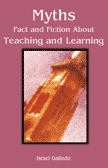The following is from the book Myths: Fact and Fiction about Teaching and Learning by Israel Galindo. How well do you know fact from fiction?
Fiction: The longest word in the English language is antidiestablishmentarianism.

Fact: That’s what I used to think too. But I’ve just learned that the longest recorded word in the English language begins methianylglutaminyl and finishes 1,913 letters later as alynalalanylthreonilar-ginylserase. I don’t know what it is, but don’t get it on your clothing, it will probably never come out!
Fiction: The capacity to learn in adults declines early in midlife. This is why learning gets harder as we grow older.
Fact: A person’s capacity to learn, if measured by ability, does not decline until around age 75—and for some, perhaps not even till after that. Diminished learning in aging is associated more with physiological limitations than actual capacity. And most of the physiological limitations most adults encounter can be easily compensated for: eyeglasses, increase lighting, hearing aids, increased learning time.
While it may take longer for middle-aged adults to learn, if given the time, their capacity for learning remains at the same level as when they were in their 20s and 30s. In addition, as adults grow older, there is a trade off in types of intelligences: as fluid intelligence declines in age (associated with memory span, spatial perception, adaptation to new situations associated with innate abilities), crystallized intelligence increases (associated with education, experience, judgment, personal values, things not dependent on physical, natural abilities). Crystallized intelligence remains stable up to about age 60—longer if the individual is engaged in continual learning and remains intellectually active.

You can order a copy of the book Myth: Fact and Fiction about Teaching and Learning by Israel Galindo (ISBN 0-9715765-4-8) directly from Educational Consultants.
